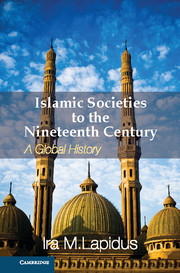Book contents
- Frontmatter
- Contents
- List of Illustrations
- List of Figures
- List of Maps
- List of Tables
- Preface
- Acknowledgments
- Acknowledgments to the first edition of A History of Islamic Societies
- Acknowledgments to the second edition of A History of Islamic Societies
- Publisher's Preface
- Introduction to Islamic Societies
- Part I The Beginnings of Islamic Civilizations
- The Middle East from c. 600 TO c. 1000
- The Preaching of Islam
- The Arab-Muslim Imperium (632–945)
- Cosmopolitan Islam: The Islam of The Imperial Elite
- Urban Islam: The Islam of Scholars and Holy Men
- Chapter 14 Introduction
- Chapter 15 Sunni Islam
- Chapter 16 Shiʿi Islam
- Women, Families, and Communities
- Part II From Islamic Community to Islamic Society
- Part III The Global Expansion of Islam from the Seventh to the Nineteenth Centuries
- Glossary
- Bibliography
- Annotated Bibliography from A History of Islamic Societies, 2nd Edition
- Index
Chapter 16 - Shiʿi Islam
Published online by Cambridge University Press: 05 February 2013
- Frontmatter
- Contents
- List of Illustrations
- List of Figures
- List of Maps
- List of Tables
- Preface
- Acknowledgments
- Acknowledgments to the first edition of A History of Islamic Societies
- Acknowledgments to the second edition of A History of Islamic Societies
- Publisher's Preface
- Introduction to Islamic Societies
- Part I The Beginnings of Islamic Civilizations
- The Middle East from c. 600 TO c. 1000
- The Preaching of Islam
- The Arab-Muslim Imperium (632–945)
- Cosmopolitan Islam: The Islam of The Imperial Elite
- Urban Islam: The Islam of Scholars and Holy Men
- Chapter 14 Introduction
- Chapter 15 Sunni Islam
- Chapter 16 Shiʿi Islam
- Women, Families, and Communities
- Part II From Islamic Community to Islamic Society
- Part III The Global Expansion of Islam from the Seventh to the Nineteenth Centuries
- Glossary
- Bibliography
- Annotated Bibliography from A History of Islamic Societies, 2nd Edition
- Index
Summary
Alongside Sunni communities, the Shiʿis developed their own expressions of Islam. In one Shiʿi view, the source of true belief in each generation was ultimately not the text of tradition, nor the consensus of jurists, nor the piety of holy men, but loyalty to the Caliph ʿAli and his descendants. The true imamate or caliphate belonged in the family of the Prophet, the Hashimite clan. In the seventh and eighth centuries, this led to a number of political movements opposing the Umayyad and ʿAbbasid dynasties. Family loyalists tried again and again to seize the caliphate. (See Figure 4.)
Defeat channeled many Shiʿis from political activity into religious reflection. The defeat of the Kufan uprising led by al-Mukhtar in 687 prompted a turn to gnosticism – the belief that human beings embody a divine spark and that they must return from this world to their true divine realm. Gnosticism generated a large number of Shiʿi sects that denied the resurrection and believed in incarnation, transmigration of souls, and continuous living prophethood. Collectively these were called extremist sects (ghulat).
- Type
- Chapter
- Information
- Islamic Societies to the Nineteenth CenturyA Global History, pp. 174 - 180Publisher: Cambridge University PressPrint publication year: 2012



